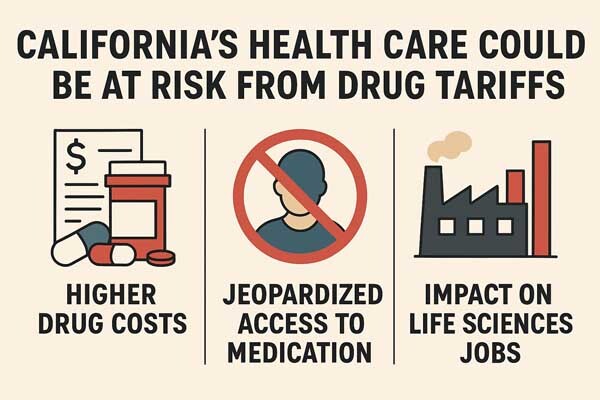 JustTheFacts Max
JustTheFacts Max![]() -
September 17, 2025 -
Health -
Medi-Cal
Health Care
Pharmacy cost
Aaron Seibert
-
1.1K views -
0 Comments -
0 Likes -
0 Reviews
-
September 17, 2025 -
Health -
Medi-Cal
Health Care
Pharmacy cost
Aaron Seibert
-
1.1K views -
0 Comments -
0 Likes -
0 Reviews

Washington Is Trading Away California's Health Care
By Aaron Seibert
Californians are already feeling the squeeze at the grocery store and gas pump. Now, the federal government may be coming for the pharmacy counter, too.
In addition to 15% tariffs on many goods from the European Union, the Trump administration is planning tariffs as high as 200% on imported medicines and their ingredients, including those from some of our closest allies. These tariffs would raise drug costs -- and jeopardize access -- for millions of Californians, especially veterans, seniors, and families living on fixed incomes.
The proposed trade action falls under a law which allows the president to impose tariffs on imports deemed a threat to national security. The idea is that taxing foreign goods will encourage domestic producers to ramp up supply, so that we aren't dependent on hostile countries for key products.
But medicines from allies like Ireland, Germany, Switzerland, and the United Kingdom don't threaten our health or national security. They help protect it.
As a combat veteran and an advocate for veterans and their families, I've helped dozens of fellow service members transition to civilian life after being wounded in combat. I've seen firsthand how veterans depend on access to essential medicines and care -- and the serious harm caused when people cannot afford or access those medicines. They delay care. They split pills. They end up in the emergency room.
Tariffs would make things worse. About one-third of the active ingredients in U.S. medicines come from Europe. In 2023, the U.S. imported $128 billion in pharmaceuticals from Europe. These aren't adversaries. They're essential partners in our healthcare system.
California would be among the hardest hit. With nearly 15 million Medi-Cal enrollees, 9 million seniors, and 1.8 million veterans, our state has one of the largest -- and most medically vulnerable -- populations in the country. Many rely on multiple prescriptions and struggle to afford them.
Because so many Californians are covered by public programs, even modest increases in drug prices would strain the state budget and disrupt care. Medi-Cal spends billions annually on prescriptions. If those dollars don't stretch as far, California could face painful choices: cut services, raise taxes, or both.
The consequences would go far beyond the pharmacy counter. California is a leader in life sciences, with more than 1.2 million jobs tied to the sector -- from scientists who research new treatments to construction workers who build the facilities where that work happens.
Biotech hubs in San Diego and the Bay Area rely on imported components to develop and manufacture medicines. Disrupting that supply chain won't just hurt patients. It'll threaten jobs and investment across California.
Some argue we should make more medicines in the United States, and that tariffs will jumpstart that shift. That's a worthy long-term goal. But it can take up to a decade and billions of dollars to build the necessary facilities. People with cancer, diabetes, or heart disease -- and veterans living with post-traumatic stress disorder or chronic pain -- cannot wait. They need their medicines now.
For decades, Democratic and Republican administrations alike have rightly treated medicines differently in trade policy. Patients can't "buy American" if the best -- or only -- treatment for their condition is made overseas.
The Trump administration should uphold that tradition and exempt medicines from these tariffs. The health of veterans, seniors, and all other Californians depends on it.
Aaron Seibert is a combat veteran, Purple Heart recipient, and retired U.S. Navy chief. He serves as a Wounded Warrior Liaison for multiple non-profit organizations and hosts the "Combat Vet Vision" podcast.
Response from Editor: JustTheFactsMax

Desert Local News is an invitation-only, members-based publication built on fact-checked, non-biased journalism.
All articles are publicly visible and free to read, but participation is reserved for members—comments and discussion require an invitation to join.
We cover local, state, and world news with clarity and context, free from political agendas, outrage, or misinformation.